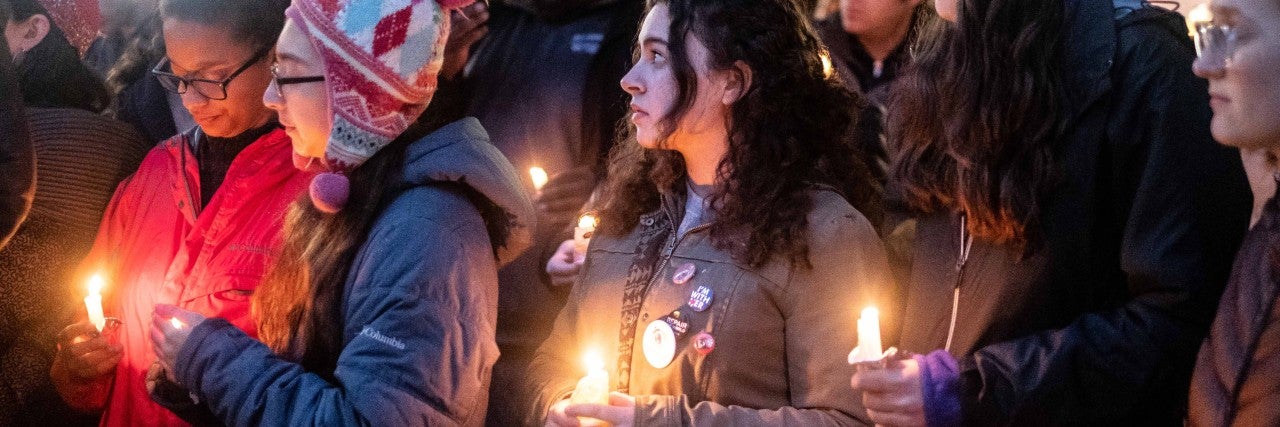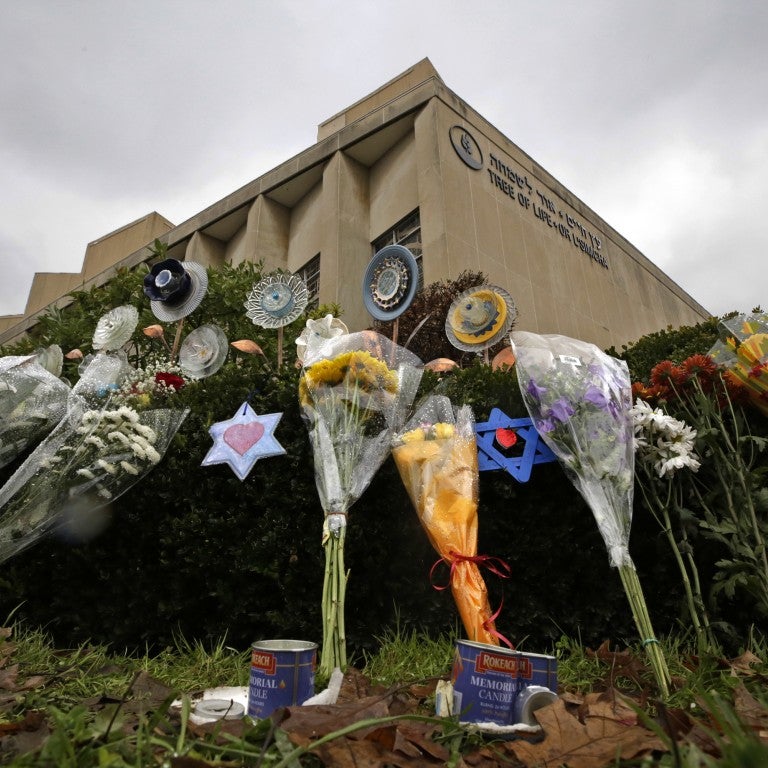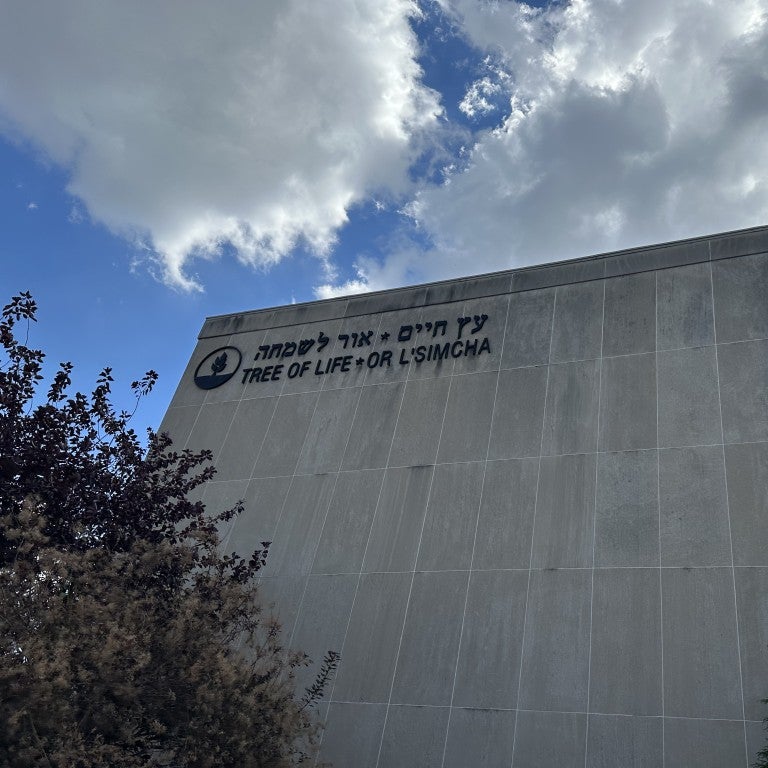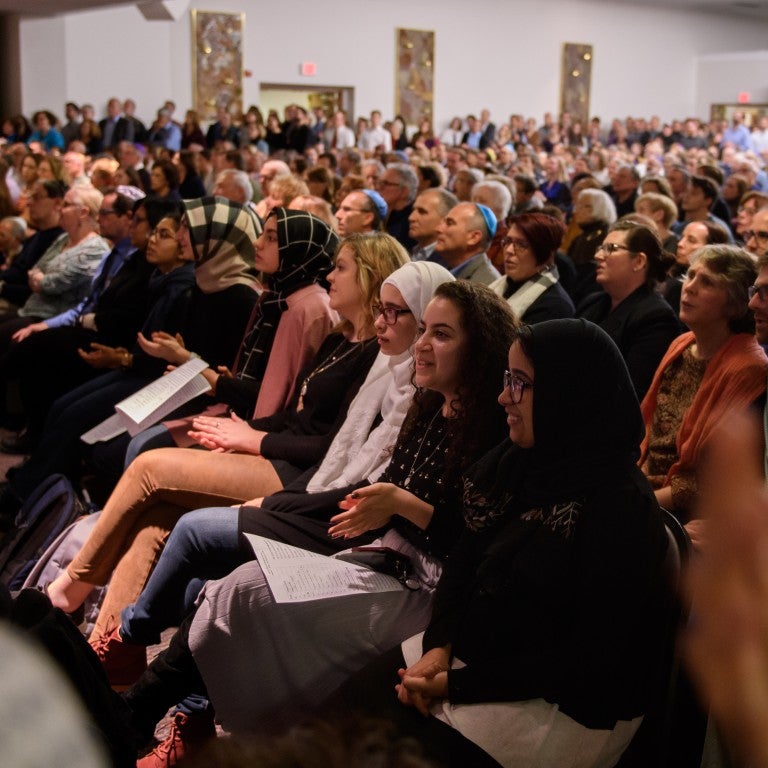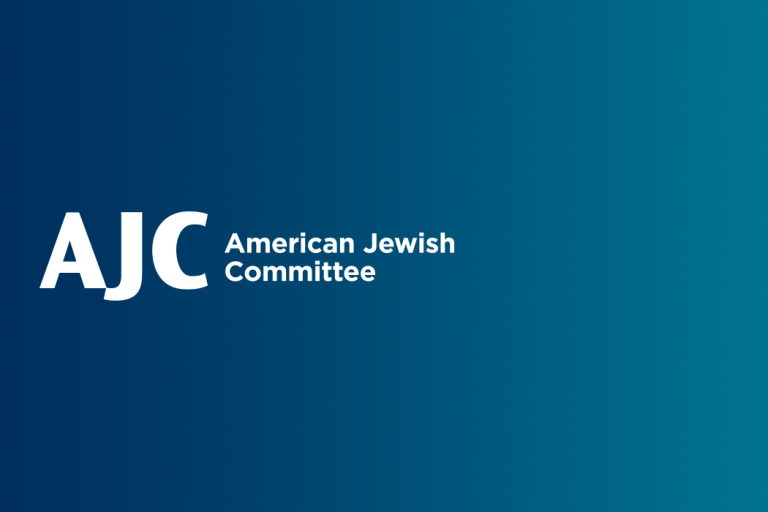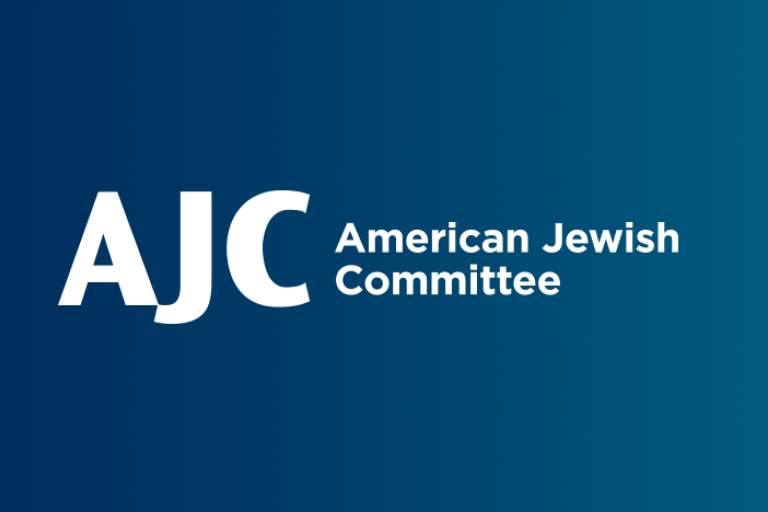October 25, 2023
Join us in a tribute to the memory of Joyce Fienberg, one of the 11 victims of the 2018 shooting at the Tree of Life synagogue in Pittsburgh. In this touching second installment of our series on the events of 10/27, we sit down with Joyce's son, Howard Fienberg, and his wife, Marnie, as they share their journey of mourning and resilience. Joyce was not only a dedicated member of the Tree of Life synagogue but also a retired university researcher, a devoted mother, and grandmother.
Howard and Marnie open up about their extended period of mourning due to trial delays, offering a glimpse into the emotional toll of such a traumatic event. Marnie details how she turned her grief into 2 for Seder, an initiative to honor Joyce and push back against the hate that creates antisemitism.
*The views and opinions expressed by guests do not necessarily reflect the views or position of AJC.
Episode Lineup:
- (0:40) Howard Fienberg, Marnie Fienberg
Show Notes:
Listen:
Take Action:
Music credits:
Follow People of the Pod on your favorite podcast app, and learn more at AJC.org/PeopleofthePod
You can reach us at: peopleofthepod@ajc.org
If you’ve appreciated this episode, please be sure to tell your friends, and review us on Apple Podcasts.
Episode Transcript:
Manya Brachear Pashman:
After her husband and mother died in 2016, Joyce Fienberg started each day at Tree of Life synagogue in Pittsburgh, to recite Kaddish, the mourner's prayer. Even when she was no longer officially considered a mourner as Jewish tradition prescribes, 11 months, she continued to attend services each morning at the synagogue.
That's why Howard Feinberg knew his mother Joyce was at Tree of Life when he heard there had been a shooting there on the morning of October 27, 2018. It would be more than 12 hours before he learned she was among the 11 killed that day.
Howard and his wife Marnie are with us now from their home in Northern Virginia to talk about their prolonged mourning period and how they have held onto and channeled that grief. Howard, Marnie, thank you so much for joining us.
Howard Fienberg:
Thanks for having us.
Manya Brachear Pashman:
Howard, you followed your mother’s example and recited kaddish for 11 months. Can you tell us a little bit about that experience? That experience of saying Kaddish and mourning for your mother, and also can you share with our listeners why it felt like the mourning period was extended?
Howard Fienberg:
I felt a huge amount of support everywhere I went, in order to be able to say Kaddish every day. Which for someone who was not the most observant of Jews, it was a big lift to be able to do that every day. In fact, even when traveling in disparate places, that I could always find, somehow, be able to pull together 10 people to be able to say Kaddish was a big deal. And I wanted to make sure that no one would struggle in similar circumstances as well.
Obviously, initially, in Pittsburgh putting together 10 people was not a particularly big lift. Because the community support in that first week of Shiva was phenomenal. But it's not an easy thing in many congregations, and I think we are fortunate in mine that we always seem to pull it out every day. But I want to make sure that it happens. So in practice wise, that's one of the biggest things, my involvement with the synagogue, and prayer.
The broader extension of the mourning period, in a way, was a result of the constant delay of the trial for the monster that committed the massacre. And that was a result of both just the general usual procedural delays that you would expect, combined with COVID excuses that dragged things out during the trial. And once a new judge took over responsibility for this case, things suddenly snapped into gear and it moved forward. And we're particularly grateful for the judge in this case, just for his very no-nonsense approach moving forward.
Manya Brachear Pashman:
Can you talk about whether the guilty verdict once it did take place, and a verdict was delivered, how that verdict changed anything for you and your family?
Howard Fienberg:
It was a matter of relief, to a great extent. I sat through almost the entirety of the trial, heard and saw all of the evidence. A lot more than I expected to and ever wanted to, but I felt duty to do so. From an outside perspective, looking at it all, you would say this is a slam dunk case, lined up for all the federal hate crimes that were involved. And at the same time, I was in doubt until the jury came back and said, all said guilty. It's just the nature of things. I was on pins and needles. Massive relief afterwards and the same thing with the final verdict and sentencing. Massive relief for us and our families.
And that did allow…nothing's ever closed. You don’t finish feeling the loss of somebody, especially when they're taken in, you know, horribly violent terrorist circumstances. But you move from segment to segment. So the same as we do in the year of mourning, you're moving from shiva, which is one kind of thing, to the 30 days, and then to the end of the mourning period. And this was moving to yet another period. And what exactly this is and how long it will be, I don't know. But we're figuring that out as we go. I certainly feel a lot more relaxed.
Marnie Fienberg:
Feels a little lighter.
Howard Fienberg:
Yes, definitely lighter.
Manya Brachear Pashman:
That's good to hear. That's good to hear. I am curious, you said you felt a duty to listen to those details, even though you didn't want to. Can you explain why you felt that sense of obligation?
Howard Fienberg:
Part of it is, somebody in our family needed to. And it wasn't something that I wanted everybody to sit and hear and see. And I specifically told friends and family as much as I could, to stay far away and said, as much as you want to know, I'll let you know. But otherwise, it's horrific. And it wasn't anything that I would wish for anybody to see and hear. But at the same time, it's the reality of how my mom died. And what the circumstances were, what was going on with the antisemitic conspiracy theories that drove the monster that killed her. And what did he have in mind, and what was his intention, what did he plan, what did he do? These were important things.
And the bigger picture, which I didn't even know going in, was the extent to which the police in Pittsburgh were so heroic. And while they were not able to save my mom, they saved other people, including friends of ours, and people who are now friends, who would not be alive if those cops had not tried to charge at the front door trying to charge the building and getting shot. And then the SWAT teams going into the building, and in a couple cases getting almost murdered themselves, trying to rescue the people that were inside. And they did rescue some people. And those people would most likely be dead if the SWAT had not rushed in. Equipment wise, they were not ready ordinarily for this sort of situation. But they went in anyways because they knew they needed to, and they didn't hesitate. And that's the kind of thing that you can only understand, having gone to the trial and learned what went on.
Manya Brachear Pashman:
Marnie, I want to turn to you. You quit your job as a federal contractor and started a nonprofit initiative called 2 For Seder. What prompted this sudden shift in your career?
Marnie Fienberg:
Well, I think that I was so upset about what happened with my mother-in-law, I did take a leave of absence initially. And I wanted to volunteer. Being a Jewish woman, and having all this anger and grief and all the support that we had received from people, literally all over the world. I just couldn't sit back and do nothing. So I wanted to do something that was really in honor of Joyce, but also something that would help every single Jewish individual if they so chose to be able to take some small tikun-olam-style action, and push back against the hate that creates antisemitism. And I think 2 For Seder really accomplished that, especially that first year. And we were really on track to grow quite enormously, except for COVID. COVID stopped us in our tracks, because it is about inviting 2 people into your home, who have never been to a Seder before and really educating them and immersing them in that Jewish joy and intimacy that you create every year at Passover.
Manya Brachear Pashman:
So I'm really curious about the seder connection. Was Joyce known for putting together really elaborate Seders? Was she just always at the Seder table? Why Seders?
Marnie Fienberg:
So this is a two part sort of explanation. So one is the sort of graduation to being allowed to hold the Seder. So my mother-in-law, really for 15 years we actually had done where we started at her house, and I helped her and I learned as we went and then we flipped it. And we came to our house and she would help me and make sure that I was doing things the right way and guiding me the right way. And there's, I mean, there's so much to do, putting on a Seder and trying to of course fit, you know, 30-35 people into a house that really should only have about 20 people in it is, of course, part of the tradition. And she never blinked an eye, it was never too much.
It was really mostly about making everyone at the table, regardless of their background–she always had students over, she always had people who had no place to go–every single person needed to feel like they were home. So if you had some sort of dietary restrictions, or any sort of an allergy or anything, my mother-in-law would bend over backwards, she bend herself into pretzels to make you feel 100% comfortable. And every single person who ever graced her table felt like they had never been more comfortable before. They felt like they were at their mother's house. And they commented on that many times. It was a wonderful thing. And I have to tell you, it's very hard to live up to. She was one of a kind.
Howard Fienberg:
If I might add in, part of this comes from looking at photo evidence. I've been going through all of the family photos, last five years, trying to digitize and you can see the progression. So early on, there are pictures of Passover seders that clearly they've invited friends and other professors at the universities, students that were Jewish, they'd invite to Passover on a regular basis. And I think there's a turn somewhere in the early 80s, my brother and I would start inviting our non-Jewish friends to the Passover Seder.
And probably around about the late 80s was when it became not just bringing in Jews and my brother's friends and my friends who had never been to a Seder, it was their friends and fellow faculty, visiting graduate students from far-flung countries who knew absolutely nothing about Judaism. Certainly nothing about Passover. It was a way for them to have a comfortable introduction to what we're all about. And in all the context that my mother wanted to provide of it being a welcoming taste of being at home.
Manya Brachear Pashman:
We talked about how the Jewish tradition provides the process of formula, you know, the shiva and the 30 day mourning period. But this, the length of time that families have been mourning has been extended, delayed, slowed down. And I'm curious if on top of the Jewish traditions that guide people through the mourning process, if the Jewish community helped fill in some of what was missing, helped comfort you in certain ways?
Marnie Fienberg:
We live in two Jewish communities right now. We live in Northern Virginia, and we have our community here. And then we live in Pittsburgh, in a sense, and we have the community there. And we have been back and forth many times. The community in Pittsburgh, regardless if you were a family member, if you were a member of one of the three synagogues, or if you were a member of the greater community. There were so many ways that there were supports. And even from here we were always invited to participate in them. And some of them were done virtually actually when COVID hit which actually was very helpful for us.
I don't know if the larger Jewish community is aware, but the FBI actually has a whole series of people, an entire division that's just there to support families and the communities that are affected from mass shootings, which also includes a grant to stand up an actual group that that is going to help the community at large. And that's the 10.27 Center for Healing in the Pittsburgh case, and that group is still standing and still running, still helping everyone.
So there's the Jewish side, where we all still pray together, where we get together for our commemoration once a year, the families always get together in Pittsburgh. And then here in Northern Virginia, there have been a variety of commemorations, but mostly our own local community at our synagogue is extremely supportive. They’re, of course, another family to us. And this has only really brought us all closer, which has been wonderful.
Howard Fienberg:
We've had a lot of different kinds of support structures, I wouldn't identify anything as where there was a failing, other than the broader problem that people thought it was over. The presumption on the part of everyone, when they found out that there was a trial for the monster that killed my mom, was: wasn't that done already?
Manya Brachear Pashman:
I want to ask you both this question, what has given you hope in the last five years?
Howard Fienberg:
I haven't had the time and strength to go through all of the letters and cards that we received in the month or two after mom was killed. But some of the ones that really impacted me the most, outside of people that we knew, or that knew my parents, I mean, I think we have a whole box of correspondence and cards from people who never met my mother or us. And a lot of those were from non-Jews, who were deeply impacted by this, and were moved.
I mean, it's one thing that we had large groups of Jews that came to our Shiva, for example, that wanted to be there to support and during the Shiva period. There were groups of students that came from universities outside of Pittsburgh, like Ohio, and from Massachusetts, they wanted to come and be a part of it, and they weren't Jewish. They just, they felt a need to support. And that's the kind of thing that gives me great hope. Part of why we look at projects like 2 For Seder as so important, that it’s not just that we're Jewish, and we're other. So I see a great load of hope there.
But at the same time, the fact that, you know, trailing back to the trial, the fact that the Justice Department was willing to pursue the trial, and not just take a plea bargain, but actually present evidence and pursue a case involving such rampant antisemitism, and lay out the facts and prosecute them. That gives me great hope as well. It's not something that is an easy thing. The most reasonable response on their part probably would have been to, no matter what we wanted, would have been to pursue a plea bargain and make it all go away. Because it's expensive, and it doesn't make anybody feel good. Why would you do it?
Manya Brachear Pashman:
So I have to ask, if the trial had happened a century ago, do you think the jury would have reached a guilty verdict? Do you think the prosecution would have pursued the hate crime charges as they did?
Marnie Fienberg:
So there would never have been any hate crime charges. Hate crimes did not enter the American laws until 1964, which is when the Civil Rights Act was enacted. This is why I think that we always need to be so thankful for Martin Luther King Jr. and to be proud that we were part of that. So a century ago, would this have even been considered an anti-Jewish crime, an antisemitic crime? No.
I think that you can look at Dreyfuss’ case and you can say very clearly, this country, this part of the world was not ready for something like that. And they would have looked the other way. Would they have convicted as just a general murder? I don't know, there's a lot of those murders that just disappeared 100 years ago. But would it have been because it was antisemitism? Absolutely not. I would be very, very interested to learn of some other way that that would have happened. But we're very grateful that the same laws under the 1964 Civil Rights Act, that is what this was all held under.
Howard Fienberg:
And the other angle is that the monster that killed everybody, he killed 11 people, he was not an upstanding part of the community, he did not have a whole segment of the community cheering him on, helping him, encouraging him, protecting him. That's not the way it worked.
And the reactions and the killing of my mom was part of the demonstration of that, that people were horrified and they were supportive of us. And, you know, the Justice Department pursuing the case to the fullest extent of the law, as they should, would that have happened 100 years ago? No, but again, not just because of the lack of statute, but you know, our place in society was not what it is today. And society was not the same.
Manya Brachear Pashman:
I know we've sprinkled details about your mother throughout this conversation, but is there anything in particular in there anything in particular that you want listeners to know about Joyce?
Howard Fienberg:
She twisted herself into knots and did whatever she could to help others, that starts with the rest of the family, and the amount of time and energy that she put toward helping us and helping my brother and sister in law and all of her grandkids, which were a huge focus of her life. The fact that she was able to also shoehorn in a lot of volunteer time at multiple different projects in Pittsburgh, as well as being the connector of our family and multiple sets of families, both email and letters and phone calls on a regular basis. It's an amazing thing that she was able to do that on a daily basis and still sleep and function. Not to mention, make sure that she was at minyan at Tree of Life early every morning. It was an amazing balancing act, y’know, it's a hard thing to pull off.
Manya Brachear Pashman:
And she picked up someone each day for minyan as well, right?
Howard Fienberg:
Yes, so unfortunately, he passed away. Late, late last year.
Manya Brachear Pashman:
May his memory be for a blessing. You know, I should ask, what does that mean to you, when this phrase, May her memory be for a blessing. What does that mean to you when someone says that about your mother?
Howard Fienberg:
I generally have an appreciation. Because, not just of what she meant to me, but the recognition from other people of the loss. And for some of them, they understand what that loss means. For others, they don't really, but they're trying to support. I do take comfort in that. I'm not certain that I did, certainly in the first week, I was too shell shocked to be able to appreciate all the people that were saying it to me. But, you know, over time, it makes a big difference. And I appreciate being able to do that for others, even complete strangers. If I'm supporting a minyan at someone's shiva, I like to be able to do that.
Marnie Fienberg:
Joyce was such a gentle, loving and caring person and to have her loss be through such an act of hate is where I think we all struggle. And I think whenever anyone talks to Howard or myself or any of the families about their losses, that they can feel that, that they can feel the shock that these people who just wanted to make the world a little bit better, a little bit of a better place, that they would be taken in such an act of hate, for no reason. I think that being able to say May their memory be a blessing really emphasizes the loss that we feel and the hope that we can fill in this space.
Howard Fienberg:
And I will say it's very awkward to talk to somebody who's in mourning. Just the nature of it. The fact that we have what almost a rote saying that carries so much weight is a huge benefit. And I deploy it regularly with non-Jews. They're partially taken aback, and they're very touched, because they're used to getting the awkward, Oh, I'm so sorry for your loss, which doesn't make anybody feel particularly good. We can argue about the way Judaism approaches all sorts of things. I happen to think the Jewish way of death, you know, as depressing as it may be to think about, is very practical in a lot of ways. And it's designed to be helpful.
Manya Brachear Pashman:
Has the rest of your family embraced that? Have they turned to the Jewish faith to cope with this, to try to make sense of it?
Howard Fienberg:
My brother was already what is called traditional in France, traditional Judaism, he embraced that much more fully, and is much more on the Orthodox range than he was before. And that was a huge part for him as well in coping, and coming to grips with our new life, after my mom died. And that is a piece of it for all of the family in different ways.
One of the positive things along these lines, my brother dedicated a Torah in memory of my parents. And by weird twist of fate, or God's hand, in choosing a date to dedicate that Torah in Pittsburgh, the date happened to land a couple of days before the final sentencing in the Tree of Life trial. So we had just a few days before, this whole ceremony and huge celebration that my brother orchestrated, to not only involve the local community and a huge celebration and things that I've heard about, but never seen.
People marching in a parade down the street, not far from Tree of Life, to introduce the new Torah to its new synagogue, but also in the final writing of the letters, finishing off the Torah, to be able to include some of the law enforcement officers that were injured in trying to rescue people at Tree of Life, as well as all of the families of the victims and the survivors. That everyone was able to participate from our family and our extended family. It was an amazing sight to behold and the simple fact that it landed right before the sentencing was kind of amazing, because there's this amazing positive outgrowth that you might not have expected. And the fact that it perfectly coincided with the darkness of the trial. It’s an amazing thing.
Marnie Fienberg:
He had been planning this for three years. When Howard says that it was an amazing coincidence to bring them both together, to bring the one of the most Jewish things you could possibly do, dedicating a new Torah, creating and dedicating the Torah, right before the sentencing. There was never a plan for that. It just, it just happened.
And it was very healing to the community. But it was also, I mean, the message of the shooter was to stop Judaism, to make us so afraid that we would never go back into the shuls, that we would never go back and be Jewish. And not only in the days right afterwards, where people flocked to go to shul. But this was just one more incredibly powerful expression, that each of the families has done so many different things, to focus on Judaism, focus on making the world a better place in memory of their loved ones. But this is just one more extraordinarily powerful example about how just being Jewish, just doing what we do best, it keeps us going.
Manya Brachear Pashman:
Marnie, Howard, thank you so much for joining us and sharing part of your journey with our listeners, it's really a valuable conversation to have.
Marnie Fienberg:
Thank you for having us. We appreciate it.
Nefesh Mountain, from the song Tree of Life [singing]:
O sweet friends, come and dry your eyes
And hold each other by this Tree of Life
I’m angry and tired of this great divide
But I sing, nonetheless, with love on our side
Manya Brachear Pashman:
This episode is brought to you by AJC. Our producer is Atara Lakritz. Our sound engineer is TK Broderick. You can follow People of the Pod on Apple Podcasts or Spotify, and learn more at AJC.org/PeopleofthePod. The views and opinions of our guests don’t necessarily reflect the positions of AJC.
You can reach us at peopleofthepod@ajc.org. If you appreciated this episode, please share it with friends and family and write a review on Apple Podcasts.
